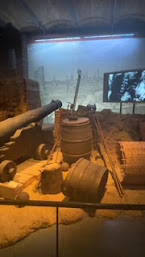My visit to ARA Newspaper: Talking about tourism, housing, and identity.
I had the chance to visit ARA, Catalonia's most widely read newspaper in the Catalan language. It was more than just a press visit—it turned into a real conversation about who belongs in Barcelona, what defines Catalonia, and how space, language, and identity are working together- or not working. ARA was founded in 2010, right as Catalonia's push for independence was regaining momentum, and it still takes a clear stance in defending Catalan culture, language, and journalism. Speaking with one of the journalists helped me see how all these ideas connect, especially citizenship, land use, nationalism, and culture preservation.
When I asked about tourism and immigration, the response was pointed. The journalist told me the problem isn't just how many tourists come, but how they disrespect Catalan culture and language, treating the city like a playground rather than a place with its own traditions and history. That's part of why, he said, Catalans are so sensitive about outsiders taking over properties; it wasn't about economics entirely, but culture. It reminds me of a class discussion we had in POL 150 on multiculturalism and nationalism. In a state that does not fully recognize its diversity, protecting local identity becomes political. This also connects with a slide I saw at ANC about hate speech towards Catalans, and how deeply cultural disrespect cuts in a region that has already fought hard to preserve its autonomy.
In POL 399, I've researched how land use and housing policy shape who gets to live in a city, and this conversation brought that into a better perspective. The journalist explained how "nomads"-people who live in Barcelona long-term but outside of formal systems (etc., extended visa) have added pressure to an already tense rental market. Even though Catalonia has rental caps, landlords get around them by offering short-term leases or using loopholes. He described it as a city split into two: those who own property, and those who rent but are constantly being pushed out. It reflects what I read in "Precarity in Paradise," one of my annotated bibliography sources, which explains how Barcelona's government often supports tourism and growth while failing to protect working-class renters. Here, even well-meaning regulations can be easily bypassed.
The conversation also turned toward Catalonia's political future. The journalist was honest: He does not think Catalonia will ever become a country. The obstacles, he said, are both economic and social- Spain controls too many financial parts, and much of the Spanish public views Catalan independence as disruptive. He also mentioned something I hadn't thought about: the loss of the Catalan language in schools, where more students are speaking Spanish at home and in the playground than in the classroom. This felt relevant to POL 150 concepts such as liberalism, nationalism, and conservatism- how a supposedly liberal democracy can support language in a school but get rid of it everywhere else, like in restaurants, on the streets, and tourist spots, relating to land use. This suppression is subtle, but holds heavy with the disappearing Catalonia language. This can tie into populism as well, where cultural fears like losing a language become central to their local politics.
What I took away here is that journalism isn't just about reporting news but defending space and identity. ARA is navigating change and resisting a language being erased. This also made me ask the questions: What does it mean to protect culture in a globalized economy like Barcelona, which makes it so hard?




Comments
Post a Comment